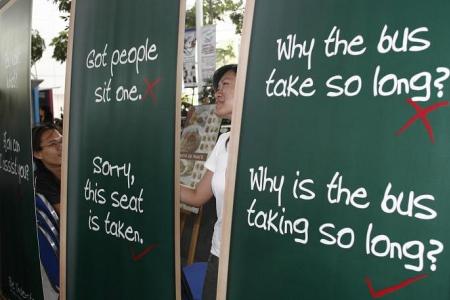Study finds ‘alamak’ most popular Singlish term
“Alamak” – an expression of shock or dismay – is the most commonly used Singlish word here, an inaugural study of slang used in Singapore has found.
“Makan”, which means to eat, and the common fillers “lah”, “lor”, “meh” and “leh”, typically used for emphasis, also ranked among the top three terms, according to the survey of more than 1,500 Singaporeans aged between 16 and in their 50s, conducted by language-learning company Preply from Ukraine.
But the majority of respondents did not understand the rising trend of Gen Z lingo, like “slay” – to do a job exceedingly well – and “rizz”, which is short for charisma.
The study, conducted between January and February 2024, aims to highlight trends and challenges people face in learning new languages and the views of native speakers regarding the use of slang, Preply told The Straits Times.
Preply’s language expert Sylvia Johnson said: “While attitudes towards slang may vary across settings and generations, there’s no denying it has an important role in language and culture.
“Getting up to speed on the local slang is a big part of learning a language and fitting in with the locals. It demonstrates not just linguistic competence but also cultural sensitivity.”
The study found that 66 per cent of respondents were able to use “alamak” in a sentence, topping the list.
The same term was humorously used by pop star Taylor Swift’s dancer Kameron Saunders on stage to rapturous applause from the crowd during her fourth concert night at the National Stadium on March 7, as part of a running gag to incorporate Singlish phrases like “walao eh” into the performance.
Other top 10 Singlish words in Preply’s findings include “paiseh”, an expression of embarrassment; “kaypoh”, meaning nosy; and “shiok”, an expression for something good or delicious.
Preply also surveyed how familiar respondents are with an emerging category of slang terms used by Gen Z, which typically refers to those born in the late 90s to around 2010.
Almost 65 per cent of respondents did not know how to use “slay” in a sentence, despite it being the most understood Gen Z word according to the study.
Around three in 10 respondents could use “sus” (short for suspicious), which was the second most understood word.
The term “sus” grew in prominence because of the multiplayer online game Among Us, where team players have to vote out a suspected imposter as they complete challenges.
“Goat” (Greatest of all time) was ranked third.
Close to 80 per cent of respondents did not understand the terms “cap” – slang for lying – and “simp”, when someone overcompensates for a person they fancy.
The majority of respondents indicated that they use slang in casual settings, like when they are with friends and family. Most also use slang at work, despite 74 per cent of respondents saying it is inappropriate to use slang in a professional setting.
But some disapproved of the use of slang at all, with around a 10th of respondents feeling that those who use slang are either “cringey”, trying too hard or being lazy.
Attitudes towards Singlish have evolved over the years, from initial concerns about English standards here to growing endorsement.
In the early 2000s, declining English standards here were attributed to the pervasive use of Singlish, which led to the launch of the Speak Good English Movement to encourage grammatically correct English, according to Government website SG101. The movement conducts workshops and programmes for Singaporeans to encourage them to use proper English.
But some critics argued for Singlish’s value in building solidarity and that it is a natural result of globalisation.
Singlish began to be validated, with more than 20 such words being added to the Oxford English Dictionary since 2016. The words include “blur”, meaning slow in understanding, and “sabo” – short for sabotage.
Get The New Paper on your phone with the free TNP app. Download from the Apple App Store or Google Play Store now


